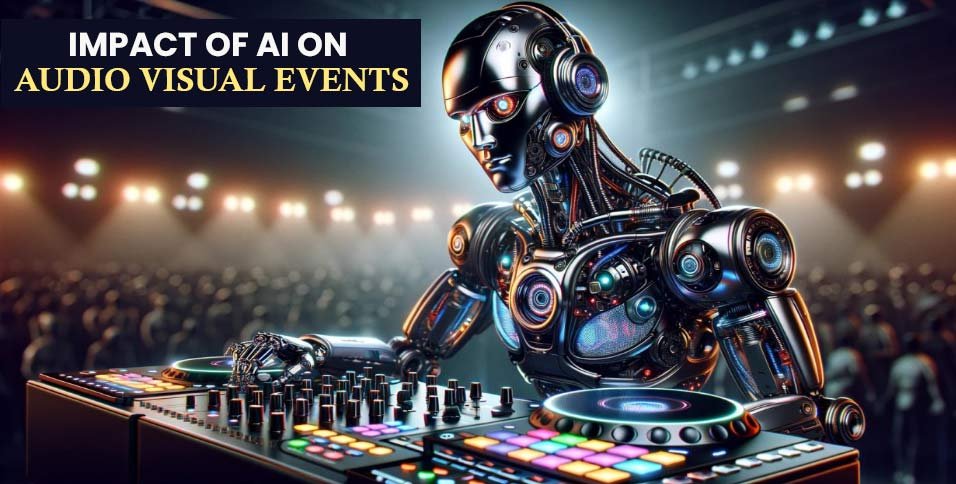In the ever-changing world of technology, artificial intelligence is a true game-changer, providing almost every industry with extraordinary capabilities. One such industry that has truly impacted from AI is the audio visual industry. AI is boosting the efficiency of every event that requires audio visual expertise. AI in audio visual events has impacted the overall functioning of audio visual businesses from creation to sales and even maintenance has grown significantly.
How Does AI in Audio Visual Events Improve Planning?
Event planning requires many complex tasks such as venue selection, budgeting, scheduling, promoting, etc. With machine learning and AI in audio visual events, these tasks become quick and efficient for the event planners.
Venue Recommendation
AI helps determine various information about venues, such as the ideal location, seating capacity, and amenities, to meet the client’s requirements. Ultimately, by providing customized solutions to clients, event planners save a lot of time and effort.
Budget Estimations
AI takes into account historical data of the venue and aligns it with the client’s requirement to showcase a budget estimation that is very accurate in terms of catering, AV equipment, and many other aspects.
Team Coordination and Promotion Analysis
AI has made it possible to analyze an event’s promotional surveys in terms of engagement and ROI. It has also effectively promoted team collaboration in terms of clear communication, tracking, real-time engagement, and managing clients and events.
How AI Transforms Event Production?
AI helps in automation and improving various event production aspects such as audio, lighting, videos, content display, and more. Let’s take a look at some relevant examples:
Intelligent Audio Mixing
AI in audio visual events intelligently mixes audio feeds from different microphones; it can clean noise and adjust volume automatically as per live feedback. It makes the work of audio engineers extremely easy and stress-free.
Automated Lighting
An AI-powered lighting control system creates mind-blowing light effects by automating light presets, transitions, and color combinations according to schedule or live audio analysis without the need for humans.
Immersive Video Streaming
Live video streaming quality is monitored, and accurate adjustments to bandwidth, resolution, and encoding are automatically made based on live data to provide seamless and immersive viewing on various devices. Real-time content moderation is also possible.
Interactive Displays
AI in audio visual events enables the detection of people around digital signage/displays and the application of computer vision to attract them with interactions and showcase contextualized content according to their preferences, location, etc.
Predictive Maintenance
AI-powered IoT sensors continuously monitor the health of crucial audiovisual equipment and, based on an algorithm, predict when it may require scheduled maintenance. This predictive maintenance ensures that no production glitches emerge due to malfunctioning equipment.
What is the Role of AI in Boosting Audio Visual Events?
For several decades, the audio visual events industry has depended on skilled professionals and manual processes to execute various events. From sound engineers continuously adjusting levels to lighting technicians working to create the right visual displays, human expertise, and experience have been integral to the industry’s success.
Nonetheless, AI in audio visual events is now an essential tool for the industry as the technology advances to augment an event professional’s capabilities. The introduction of AI into audio-visual events has been a gradual process that started with the introduction of intelligent systems for lighting and sound control.
Notably, AI applications early in the process enabled effective event management through better control systems and the dispensation of wasteful hours that professionals spent adjusting settings.
AI-Powered Event Planning and Logistics
The first domain of AI’s impact on audio-visual events is the planning and logistics. Through the ability of machine learning to analyze data and process immense amounts of information, AI-based algorithms can provide optimal conditions for organizing an event by selecting a venue, managing resources, keeping track of attendees, optimizing schedules, as well as other useful functions.
AI-Driven Venue Selection
By analyzing factors such as location, accessibility, capacity, and amenities, AI in audio visual events can identify the most suitable venues for specific audio-visual events. This not only streamlines the venue selection process but also ensures that the chosen location aligns perfectly with the event’s requirements and objectives.
Resource Optimization
AI applications can analyze historical event data and the current market situation to optimize resource allocation, including providing event participants and organizers with the necessary equipment, personnel, and products without emissions and unnecessary spending.
Attendee Management
AI-powered attendee tracking and analysis can collect valuable data on attendee behavior, preferences, and needs, thus helping event planners personalize the experience, improve event flow, and increase satisfaction.
Scheduling and Logistics
AI in audio visual events can also manage complex schedules efficiently, including coordinating speaker sessions, entertainment activities, and catering services attached to an audio-visual event. It can help optimize complex logistics, reduce incidents, and eliminate or, in significant cases, reduce delays.
How is AI Contributing to Create Immersive Event Experiences?
In video-art scenarios, AI enables the creation of immersive and unforgettable experiences for guests. Advanced technologies such as computer vision, NLP, and generative adversarial algorithms open new horizons for event organizers. This is why it is beneficial for audiovisual businesses to understand the utilization of AI-driven automation tools for creating AV event designs and drawings that help through the overall process from creation to installation and execution of such events as well.
Interactive Installations
AI-driven digital installations that can respond to visitor motions, gestures, and even emotions. This feature makes the artwork feel interactive for the guests by blurring the gap between virtual and physical reality.
Personalized Content
AI-generated audio-visual material aligned with the guest’s preferences. AI-powered content and personalization enable visitors to see and hear the content that is right for them, appealing to their preferences and their minds or feelings. This makes visitors more likely to remember the event and recommend it to their peers.
Augmented Reality and Virtual Reality
AI plays a key role in enabling the integration of AR and VR technology in audiovisual events. AI can use real-time data collection and environmental analysis to improve the two technologies and enhance reality, making the experience more realistic and interactive with attendee interactions.
AI-Generated visuals and Soundscapes
AI also uses generative adversarial networks and other AI technologies to provide visual and sound designs that are not only beautiful and eye-catching but also responsive to the event atmosphere and attendees’ actions.
What is the Impact of AI on Enhancing Event Security?
A paramount concern for all audio-visual events is the safety and security of the participants. In this regard, AI in audio visual events serves to provide interior security measures and pre-mitigation.
Facial Recognition and Access Control
Computer vision and pattern recognition algorithms allow AI to observe crowd behavior and identify potential threats or abnormalities. The AI immediately communicates these to security personnel, who can then act proactively to address the threat.
Crowd Monitoring and Risk Management
AI analyzes other factors surrounding historical data, the current situation, and situational variables to provide a possible future threat model and risk deflection, which the event organizer can plan accordingly to ensure the safety of its audience.
Cybersecurity and Data Protection
Given the level of digitalization, AI-powered cybersecurity solutions are necessary for the protection of sensitive data, prevention of cyber attacks, and ensuring that the running system is safe.
Role AI in Improving Event Analytics
Notably, the key advantage of AI in audio visual events is its ability to collect and analyze massive amounts of data aggregately. Therefore, the approach based on the data helps obtain the necessary information for subsequent planning of the same events, resource allocation, and further progressive enhancement.
Attendee Behavior Analysis
AI can analyze attendee data, such as movement patterns, dwell times, and engagement levels, to help organizers understand attendee preferences and behaviors. As a result, the organizers can make informed, data-driven decisions for future event planning.
Content and Speaker Performance Evaluation
AI can perform sentiment analysis and natural language processing to evaluate the performance of speakers, entertainers, and content for improvement and guarantee future events also provide exciting experiences.
Marketing and Sponsorship Optimization
AI in audio visual events can also analyze attendee data, social media engagement, and marketing campaign performance to help organizers identify and implement the most successful marketing strategies and sponsorship opportunities. This way, event organizers and sponsors can get maximum returns on investment.
Predictive Modeling and Trend Analysis
AI can be used in combination with machine learning algorithms and historical data to monitor emerging trends and develop predictive models. In this way, event organizers can foresee which lines of operation to perfect and which strategies to pursue.
The Future of AI in Audio-Visual Events
Given the rapid technological development in this sector, there is hardly any limit to AI applications in audio-visual events. The combined forces of professionals and researchers are already doing remarkable things and are going to even bolder lengths.
AI-Human Collaboration
AI can and probably will be integrated fully into human professionalism, thus becoming IRL assistants. The result is bound to be mind-blowing: the possibility not only to analyze but to feel the strategies.
Generative AI and Dynamic Content Creation
Generative AI models like large language models and diffusion models have the potential to entirely alter gaming when it comes to content production for audiovisual events. They can generate real-time dynamic and contextual audiovisual content that can change based on the attendee’s reactions and event problems, devising encounters that are truly one-of-a-kind and unforgettable.
AI-Driven Metaverse Experiences
AI will be a critical component in generating animated and interactive virtual worlds. Thanks to AI technology, attendees will be able to attend audiovisual events worldwide and experience them as if they were physically there.
Ethical Considerations and Responsible AI Deployment
The opportunities of AI in audio visual event development require attention to ethical and responsible deployment considerations. Event planners should focus on data privacy, algorithmic fairness, and transparency to apply AI as a technology that contributes to society’s prosperity and prevents risks and negative implications.
How AI-driven Software Helps AV Event Planners?
Audio visual drawing creation and automation software help system integrators create valuable and descriptive designs for AV equipment installations at such events.
Such software also offers technical assistance from creation to sales, saving time for event planning. An AI-powered software enables you to create floor plans, signal flow diagrams, schematic diagrams, and possibly every drawing required to plan an event.
Such AI software is powered by communication tools to enhance team collaboration, ultimately allowing event planners to manage all aspects of their business, from proposing deals to executing them for clients.
Conclusion
The inclusion of AI in audio visual events is not just a technological advancement. This change also represents a shift in the manner of audiovisual events being planned, communicated, and executed. Event organizers have a true opportunity to reach remarkable heights with the inclusion of technology. AI ensures that people attending such events experience quality service and are amazed by the possibilities AI presents in events.















